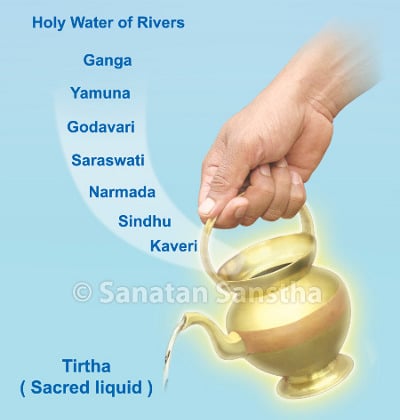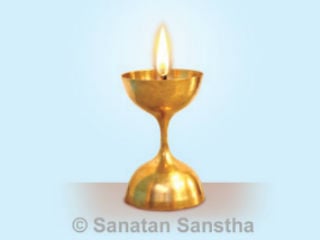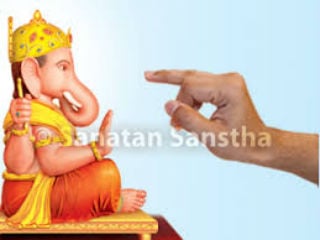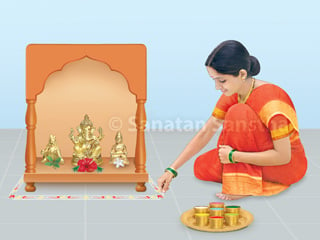
Water of the seven Holy rivers
The seven rivers referred to, are the Holy rivers Ganga, Yamuna, Godavari, Saraswati, Narmada, Sindhu and Kaveri. Water collected from these seven rivers is put in the ritualistic pot, which is used during ritualistic worship.
‘Water from these seven Holy rivers has the ability to attract and transmit the waves of Saptadevtas (Seven superior Deities). India is known as the most sattvik place on earth because it is the only country through which, all these seven rivers flow. Many yogis (Those who have reached the state of union with God (Brahman), by following Yoga) have undertaken penance on the banks of these rivers so as to acquire the Principles of the Saptadevtas in the Universe. This water from the ritualistic pot is used for performing Abhishek. The subtle sound waves from the ritualistic pot absorb the waves of the Saptadevtas in the water and effectively transmit them into the environment. Since these subtle sound waves have a higher speed and expanse, the effectiveness of the waves of the Saptadevtas transmitted into the environment through the water of the seven rivers remains in the environment for a longer period. Since these waves are transmitted with the help of the particles of the Apatattva (Absolute Water Principle) in the water and the particles of the Akashtattva (Absolute Ether Principle) from the sound waves in the ritualistic pot, this water can be consumed as Tirtha. By consuming the Tirtha with bhav (Spiritual emotion) and bhakti (Devotion), the Divine waves in this Tirtha activate the Panchapran (Five vital energies), which are lying dormant, in the form of gases around the navel, of the devotee. With the help of these subtle gases these Divine waves spread all over the body of the devotee. As a result, purification of the prana (Vital energy)and pranamay-kosha (Vital energy sheath) of the individual occurs. Hence, consuming Tirtha gives the individual Sattvik satisfaction and his mind becomes Blissful and enthusiastic.
Seven rivers |
Ability to attract and transmit which Deity’s Principle ? |
Sensation on touching the water |
The level of the sagun (Manifest) / Nirgun (Non-manifest) Principle in the water (Note 1) |
|---|---|---|---|
| 1. Ganga | Deity Shiva | Cold | Nirgun |
| 2. Godavari | Shriram | Cool | Nirgun-sagun |
| 3. Yamuna | Shrikrushna | Cool-hot | Nirgun-sagun (in equal proportion) |
| 4. Sindhu | Deity Hanuman | Hot-cool | Sagun-nirgun (in equal proportion) |
| 5. Saraswati | Shri Ganapati | Luke warm | Sagun-nirgun (more nirgun when compared with Kaveri) |
| 6. Kaveri | Deity Datta | Hot | Sagun-nirgun |
| 7. Narmada | Devi Durga | Very hot | Sagun |
Note 1 : The rivers have been arranged in the order of the level of the Principle of the associated waves.
The difference between sagun-nirgun (in equal
proportion) and nirgun-sagun (in equal proportion)
Sagun-nirgun
|
Nirgun-sagun
|
|
|---|---|---|
| 1. The Principle that manifests while becoming functional | Sagun appears with the support of the nirgun | Sagun along with more nirgun. Along with greater proportion of nirgun, a small proportion of sagun appears |
| 2. Functioning | Sagun functions on the strength of nirgun | Sagun functions actively along with more of nirgun, with the support of nirgun |
| 3. Level of the frequencies | Subtle | Subtler |
| 4. Spiritual experience | of Shakti (Energy) | of Anand |
| 5. Potential and expanse of the frequencies | Less | More |
| 6. Speed of the frequencies | High | Low |
| 7. Attraction of frequencies is towards | Getting converted into sagun | Going towards nirgun |
(Through the medium of Mrs. Anjali Gadgil, 21st November 2004, 7.01 p.m.)
In the present times, it is difficult to procure water from all the seven Holy rivers. When Holy river water is unavailable one may use ordinary water. When filling the ritualistic pot with ordinary water the mantra ‘Gange cha Yamunechaiva…’ is recited to invoke the seven rivers.

 Waving a lit lamp symbolizes puja of Deity with Atmajyoti
Waving a lit lamp symbolizes puja of Deity with Atmajyoti Benefits of applying gandha followed by offering of haldi and kumkum to Deities
Benefits of applying gandha followed by offering of haldi and kumkum to Deities Shodashopachar puja – Means of abiding Dharma in a ritualistic and bhav enriched manner
Shodashopachar puja – Means of abiding Dharma in a ritualistic and bhav enriched manner What are the benefits obtained from Puja preparations?
What are the benefits obtained from Puja preparations? Importance of drawing Rangoli as a part of Puja preparations
Importance of drawing Rangoli as a part of Puja preparations Sounding of a conch at the commencement of a puja
Sounding of a conch at the commencement of a puja